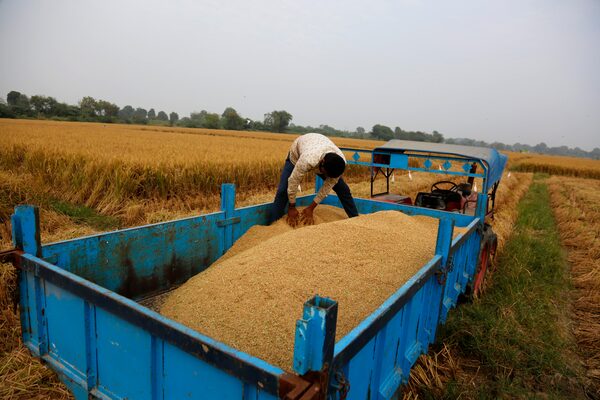
A man arranges harvested paddy on a tractor trolley in a field on the outskirts of Ahmedabad, India, on Nov. 19.Ajit Solanki/The Associated Press
By the time India’s Prime Minister, Narendra Modi, announced on Thursday night that his government would withdraw three controversial agricultural laws, many Canadians had already gone to sleep. But people in Surrey, B.C. were still wide awake. For the last year, Scott Road in Surrey had been the site of an indefinite sit-in. The protest was organized in solidarity with farmer unions in India, who were leading a movement against the laws. On Thursday, community activist Mandip Kharod drove to Scott Road after Mr. Modi’s announcement. At the site of the protest, she found people celebrating the announcement, dancing to Punjabi music.
“When I reached, I saw dozens had already gathered there. They were singing, they were dancing, they were hugging each other. Many of us cried tears of happiness and relief,” she said.
Punjabi activists across Canada welcomed the news of the Indian government’s withdrawal of three controversial agricultural laws with relief and cautious optimism. Passed last year, the laws triggered a protest movement by farmers, primarily from the northern state of Punjab. Had the regulations been implemented, they would have opened the doors to farming in India to giant corporations. Farmers’ unions rose up in objection, camping out at the border of India’s capital, New Delhi, where many protesters still remain more than a year later.
India’s Modi to repeal controversial farm laws that led to protests
As elections in the Indian states of Punjab and Uttar Pradesh draw near, political pressures forced Mr. Modi climb down from his position. This also drew jubilant reactions from many in Canada, where members of the Punjabi diaspora had also been organizing protests in solidarity. Canadian cities such as Surrey and Brampton, Ont., which have a large South Asian population, had seen rallies in recent months with hundreds in attendance.
“We’d all been fighting so hard because we thought we could win. But the announcement still felt surprising,” said Brampton resident Jaskaran Sandhu, director of administration at the World Sikh Organization. “There were a lot of naysayers who said Modi would not break. The story of the farmers’ movement is very much a story of an underdog winning. We will spend the rest of our lives looking back at this movement.”
Mr. Modi’s announcement came on the sacred day of Gurpurab, the birth anniversary of Guru Nanak Dev, the founder of Sikhism. While the farmers’ movement was a multifaith protest spanning several areas of India, it was spearheaded by Sikhs from the Punjab region.
“Guru Nanak Dev Ji started a movement that challenged repressive systems,” Mr. Sandhu said. “People involved with the movement saw this as a chapter of the same movement that he started centuries ago. The symbolic importance of this day is not lost on the community.”
The Ottawa Punjabi Association had organized a three-month-long protest outside the Indian High Commission last winter. The group plans to organize a langar – or Sikh community kitchen – at the same spot on Nov. 27 to show their thanks to those who supported the movement.
“We will offer our gratitude to the elders in Punjab who led from the front, but also for community in Ottawa,” Vinny Manes, one of the organizers, said. “People of all races and ethnicities supported our movement and put up with the inconvenience. We will invite them to break bread with us.”
Any relief felt by supporters of the farmers’ movement is tempered by caution, however. Mr. Modi said the laws will be formally repealed over the next few weeks by India’s Parliament. Farmers’ unions have said they will not end their protest till that happens – and activists in Canada are following suit.
“The Scott Road protests were organized in solidarity with the morcha (sit-in) in India. As long as farmers are sitting outside Delhi, we will not end the protest in B.C.,” Ms. Kharod said.
“We can’t take Modi for his word – we will wait for the laws to be formally repealed.”
Our Morning Update and Evening Update newsletters are written by Globe editors, giving you a concise summary of the day’s most important headlines. Sign up today.